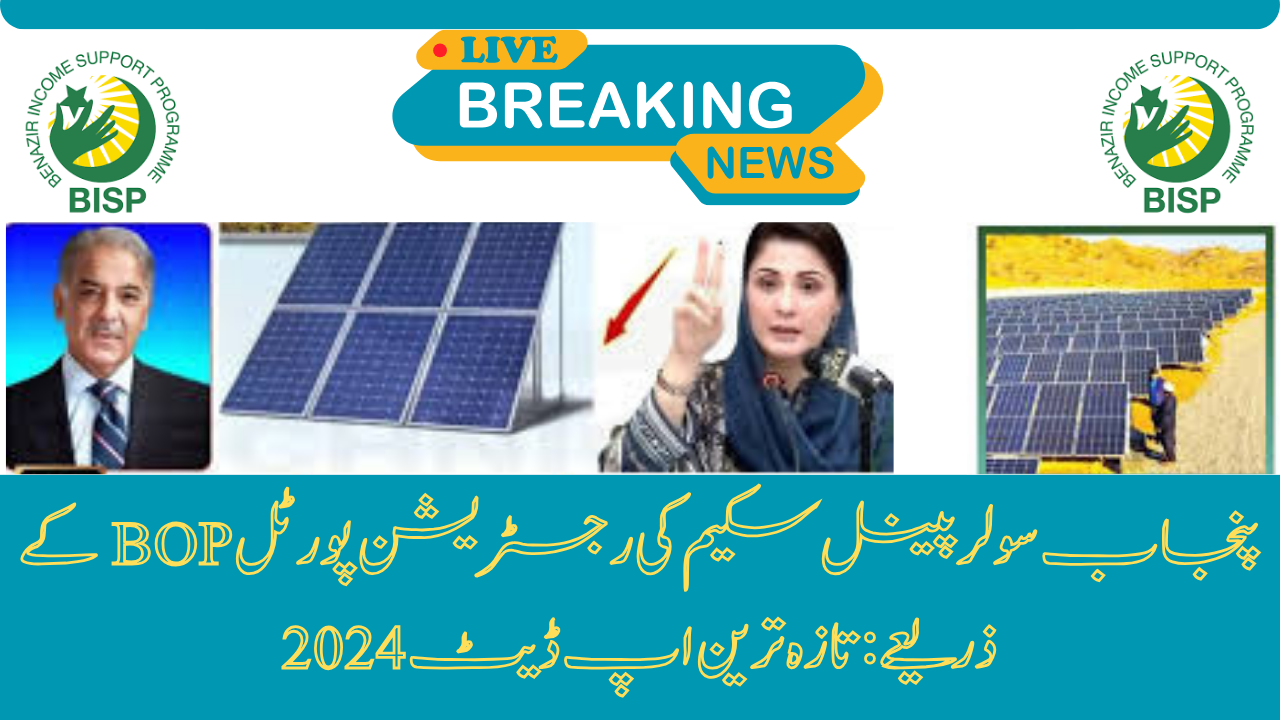Punjab Solar Panel Scheme
The Government of Punjab has introduced a transformative initiative aimed at alleviating energy crises and promoting sustainable energy usage among its citizens. The Punjab Solar Panel Scheme, a vital part of this green energy push, is now offering free solar systems to consumers with a monthly consumption of up to 200 units. This initiative, managed through the Bank of Punjab (BOP) portal, aims to encourage the use of renewable energy, reduce electricity bills, and contribute to environmental conservation. This article provides an in-depth look at the latest updates for 2024 regarding the registration process and benefits of this scheme.
Background of the Scheme
In response to the increasing energy demands and rising costs, the Punjab government has embarked on an ambitious plan to promote renewable energy sources. The Solar Panel Scheme is designed to support low-income households by providing them with solar panels at no cost, thus enabling them to generate their own electricity. This not only eases the financial burden on these families but also aids in the reduction of the overall energy deficit in the region.
Key Objectives
The main objectives of the Punjab Solar Panel Scheme are:
- Promote Renewable Energy: Encourage the adoption of solar energy as a sustainable and eco-friendly power source.
- Reduce Electricity Bills: Help low-income households lower their monthly electricity expenses.
- Environmental Conservation: Reduce carbon footprints and combat climate change by decreasing reliance on fossil fuels.
- Energy Independence: Enable households to generate their own electricity, reducing dependence on the national grid.
Eligibility Criteria
To qualify for the Punjab Solar Panel Scheme, applicants must meet the following criteria:
- Residency: Applicants must be residents of Punjab.
- Electricity Consumption: The household’s monthly electricity consumption should not exceed 200 units.
- Income Level: Preference is given to low-income families to ensure the scheme benefits those who need it the most.

Registration Process
The registration process for the Punjab Solar Panel Scheme is streamlined through the Bank of Punjab (BOP) portal. Here is a step-by-step guide to the registration process:
- Visit the BOP Portal: Applicants need to visit the official Bank of Punjab portal dedicated to the Solar Panel Scheme.
- Create an Account: New users must create an account by providing basic information such as name, CNIC number, and contact details.
- Login: Existing users can log in using their credentials.
- Fill Out the Application Form: Complete the online application form with accurate details regarding household information, monthly electricity consumption, and income level.
- Upload Required Documents: Attach necessary documents, including a copy of the applicant’s CNIC, recent electricity bills, and proof of income.
- Submit the Application: Review the application form to ensure all information is correct before submitting it online.
- Confirmation: Upon successful submission, applicants will receive a confirmation message along with a reference number for tracking purposes.
Verification and Approval
After the application is submitted, the following steps occur:
- Initial Screening: The submitted applications undergo an initial screening to verify the information provided.
- Field Verification: Authorized personnel may conduct field visits to validate the details and assess the site for solar panel installation.
- Approval: Eligible applicants will receive an approval notification via SMS or email, along with further instructions.
- Installation Schedule: Approved applicants will be provided with a schedule for the installation of the solar panels at their premises.
Benefits of the Scheme
The Punjab Solar Panel Scheme offers numerous benefits to the participants:
- Cost Savings: By generating their own electricity, households can significantly reduce their monthly electricity bills.
- Energy Security: Solar panels provide a reliable source of energy, ensuring a constant supply even during power outages.
- Environmental Impact: Utilizing solar energy helps reduce greenhouse gas emissions, contributing to environmental conservation.
- Long-term Investment: Solar panels have a long lifespan and require minimal maintenance, making them a valuable long-term investment for households.
Challenges and Solutions
While the Punjab Solar Panel Scheme presents a promising opportunity, it is not without challenges. Some of the notable challenges include:
- Awareness: Ensuring that eligible households are aware of the scheme and understand the benefits of solar energy.
- Infrastructure: Installing solar panels in remote or underdeveloped areas can be logistically challenging.
- Maintenance: Ensuring that households have the knowledge and resources to maintain the solar panels.

To address these challenges, the government is implementing several solutions:
- Awareness Campaigns: Conducting extensive awareness campaigns through various media channels to educate the public about the scheme.
- Collaboration: Partnering with local organizations and community leaders to facilitate the installation process in remote areas.
- Support Services: Providing training and support services to beneficiaries to ensure proper maintenance of the solar panels.
Conclusion
The Punjab Solar Panel Scheme is a groundbreaking initiative that aims to revolutionize energy consumption patterns in the region. By offering free solar systems to low-income households, the scheme not only alleviates the financial burden on these families but also promotes sustainable energy practices. The streamlined registration process through the BOP portal makes it accessible and convenient for eligible applicants. As the scheme progresses, it is expected to bring about significant economic, social, and environmental benefits, contributing to a greener and more sustainable future for Punjab
